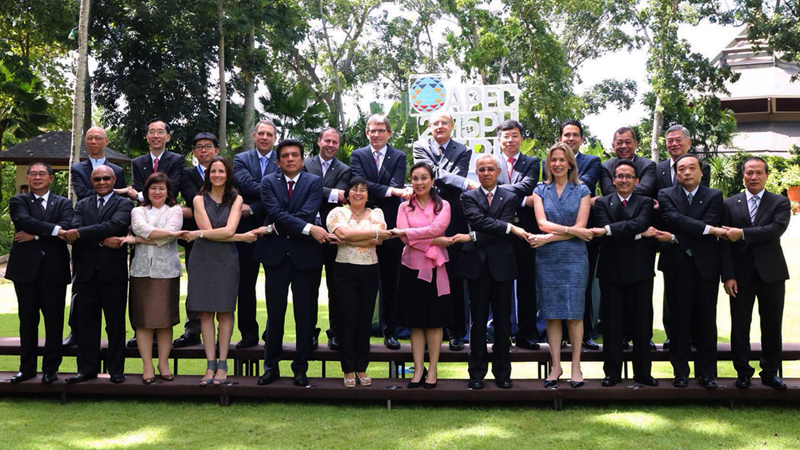

The 12th APEC EMM Chair, OIC-Secretary Zenaida Y. Monsada and the 21-Member Economies’ Energy Ministers, together with the EMM12 Keynote Speaker, Senator Loren Legarda. Photo by: DOE-Media Affairs Group
(Lapu-Lapu City, Cebu). The Philippines is set to co-chair the Asia-Pacific Economic Cooperation (APEC) Task Force on Energy Resiliency with the United States following the Philippine hosting of the 12th Energy Ministers' Meeting (EMM12) in Cebu with the theme, "Towards an Energy Resilient APEC Community."
The Task Force shall serve as a venue for sharing information, and capacity building, among others, to ensure energy resilient infrastructures and systems. Resiliency is the ability to recover from natural and human-induced disasters, return to normalcy in the most efficient manner and to build back better. The first meeting of the Task Force to be organized by the US Department of Energy will coincide with the 50th APEC Energy Working Group Meeting this coming December in Hawaii.
Alongside this initiative, the Ministers also issued the “Cebu Ministerial Declaration and Instructions” during the EMM12.
“The Energy Ministers came up with a framework on energy resiliency and instructions to the Energy Working Group (EWG) to formulate action plans that will concretize the vision of the APEC Energy Ministers,” Philippine Department of Energy OIC-Secretary Zenaida Y. Monsada said.
Four sub-themes have been put forth in the EMM12 to stimulate energy resiliency in the Asia-Pacific region.
For one, Climate-proofing of Energy Infrastructures in the APEC Community, which involves the conduct of vulnerability assessment (e.g., regional geo-hazard maps), exploration of best practices in enhancing the quality of electric power infrastructure, undertaking of research and development programs, sharing of information on energy infrastructure technology advancements, and technological innovations, among others, has been adopted.
Secondly, Advancing Cutting-Edge Energy Efficiency Technologies, which has also been agreed upon by the Ministers, covers the conduct of cost-benefit analysis of available energy efficient technologies, development of minimum energy performance standards; potential adoption of fuel quality and vehicle efficiency standards, and APEC’s aspirational goal of attaining the reduction of energy intensity by 45% by 2035 from 2005 levels. Likewise, equal and gender-fair human resource capacity development has also been adopted under this theme.
On Community-based Clean Energy Use in Energy Poverty Stricken Areas, the Ministers also agreed to explore strategies to drive the shift towards green buildings through adoption of energy efficiency technologies and by coming up with an energy eco-tourism development framework, considering that energy is critical to spurring economic activities in the tourism sector. Likewise, promotion of clean energy programs complements the pursuit of APEC’s aspirational goal of doubling the share of renewable energy by 2030 from 2005 level.
Lastly, the Ministers have adopted Improving Energy Trade and Investment in APEC, which emphasizes energy infrastructure planning and development, and regional energy interconnectivity; adopting public-private partnership especially for the nascent LNG industry; securing both energy and water resources as these are critically affecting one another; developing new markets and trading hubs; and increasing investment in green economy through Green Energy Finance.
The Ministerial Instructions are expected to be implemented by the EWG, Experts Groups on Energy Efficiency and Conservation, New and Renewable Energy Technology, Clean Fossil Energy, Energy Data and Analysis, and the Low Carbon Model Town Task Force. The Experts Groups are being supported by two centers of excellence of APEC on energy cooperation –the Asia-Pacific Energy Research Centre (APERC) and the APEC Sustainable Energy Center (APSEC).
In addition, the Meeting’s plenary session featured interesting insights and discussions on the EMM Themes provided by resource experts from the International Energy Agency, Asian Development Bank, Royal Melbourne Institute of Technology, and the APEC Business Advisory Council (ABAC).
The APEC EMM12 is the last Ministerial Meeting prior to the APEC Economic Leaders’ Meeting (AELM) on 18-19 November 2015 at the Philippine International Convention Center, which will conclude the Philippines’ hosting of the APEC 2015.
The 21-Member Economies of APEC include Australia, Brunei Darussalam, Canada, Chile, People’s Republic of China, Hong Kong, China; Indonesia, Japan, Republic of Korea, Malaysia, Mexico, New Zealand, Papua New Guinea, Peru, The Philippines, Russia, Singapore, Chinese Taipei, Thailand, The United States, and Vietnam.
